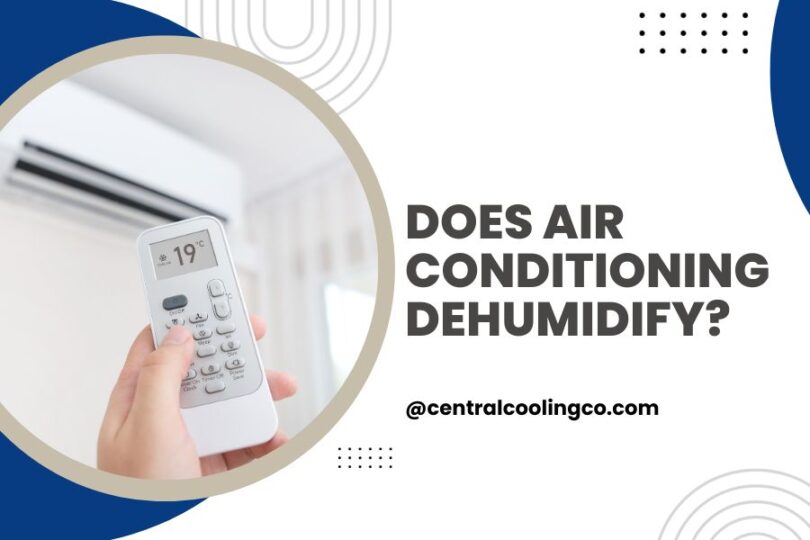Introduction:
When it comes to keeping our homes comfortable, air conditioning plays a vital role. Not only does it help regulate the temperature, but it also helps control humidity levels. However, many people often wonder: Does air conditioning dehumidify?
In this blog post, we will explore the role of air conditioning in dehumidification and how it helps create a more comfortable living environment.
The Basics Of Humidity:
Before we dive into the connection between air conditioning and dehumidification, let’s understand the basics of humidity. The quantity of moisture in the air is referred to as humidity. It is often measured using a hygrometer device and is expressed as a percentage. High humidity levels can make the air feel sticky and uncomfortable, while low humidity levels can lead to dry skin and respiratory issues.
Air Conditioning And Dehumidification:
Air conditioning systems are primarily designed to cool the air by removing heat. However, the cooling process also has the side effect of removing moisture from the air, thus helping in dehumidification. Warm air entering the AC unit passes over evaporator coils containing refrigerant. The air cools as a result of the refrigerant absorbing its heat. As the air cools, the moisture in the air condenses on the evaporator coils, effectively removing humidity from the air.
Once the moisture condenses on the evaporator coils, it drips into a drain pan and is drained out of the system. You may notice water dripping from your AC unit when it is running. Removing moisture from the air is a natural byproduct of the cooling process in air conditioning systems.
How Air Conditioning Works:
Before understanding how air conditioning affects humidity, it’s important to grasp how it works. Air conditioning systems use the refrigeration cycle to cool the air. The process involves three main components: the compressor, the condenser, and the evaporator.
The compressor compresses a refrigerant gas, which increases its temperature. The hot gas then flows into the condenser, releasing heat into the outside environment. As the refrigerant cools down, it becomes a liquid and flows into the evaporator. The liquid refrigerant evaporates in the evaporator, absorbing heat from the surrounding air and cooling it down.
To learn more about air conditioning options, check out “How Does Ductless Air Conditioning Work?”
Reducing Humidity:
While the primary function of air conditioning is to cool the air, it does have a secondary effect of reducing humidity. The moisture in the warm air condenses on the cool surface of the evaporator coil as it passes over it. This condensation process removes moisture from the air, effectively reducing humidity levels.
However, it’s important to note that air conditioning is not specifically designed to dehumidify the air. Its dehumidifying effect is a byproduct of the cooling process. Air conditioning can make the air more comfortable in areas with high humidity by reducing the moisture content.
Benefits Of Dehumidification:
Dehumidification is essential for creating a comfortable living environment, especially in humid climates. Here are some benefits of dehumidification:
- Reduced moisture levels help prevent the growth of mold, mildew, and dust mites, which can trigger allergies and respiratory issues.
- Dehumidified air feels cooler, allowing you to set your thermostat at a higher temperature and save on energy costs.
- Lower humidity levels reduce the risk of condensation on windows and other surfaces, preventing water damage and mold growth.
- Dehumidification helps improve indoor air quality by reducing musty odors and creating a fresher environment.
Limitations Of Air Conditioning In Dehumidification:
While air conditioning can help reduce humidity levels, it may not be sufficient in extremely humid conditions. A dedicated dehumidifier may be necessary in areas with excessive moisture to effectively control humidity levels.
Additionally, running the air conditioner at very low temperatures for extended periods can lead to overcooling and discomfort. It’s important to balance cooling and dehumidification to create a comfortable indoor environment.
Supplementing Dehumidification:
While air conditioning systems dehumidify to some extent, they may need to be increased in extremely humid conditions or areas with excessive moisture problems. In such cases, it may be necessary to supplement dehumidification with standalone dehumidifiers. These devices are specifically designed to remove moisture from the air, helping maintain optimal humidity levels.
Tips for Optimizing Air Conditioning’s Dehumidifying Effect:
If you want to maximize the dehumidifying effect of your air conditioning system, here are some tips:
- Set the temperature to a comfortable level. Avoid setting it too low, leading to excessive cooling and increased energy consumption.
- Use the “dry” or “dehumidify” mode. Many modern air conditioners have a dedicated dehumidification mode. This mode allows the unit to prioritize dehumidification over cooling.
- Maintain your air conditioning system: To guarantee peak performance, clean and maintain your air conditioning system on a regular basis. A well-maintained system will be more effective in reducing humidity levels.
Frequently Asked Questions:
Is Air Conditioning Enough To Dehumidify A Whole House?
While air conditioning can effectively dehumidify a single room or a small space, more is needed to dehumidify an entire house. In such cases, additional dehumidification systems may be required.
Why Is Dehumidification Important For Indoor Comfort?
Lower humidity levels create a more pleasant living environment by reducing mold, odors, and the risk of condensation.
When Should I Consider Using A Dedicated Dehumidifier?
A standalone dehumidifier may be necessary to effectively control areas with excessive moisture or extremely high humidity.
Conclusion:
While air conditioning systems play a crucial role in reducing humidity levels, particularly in moderately humid environments, they may fall short in excessively humid conditions. While air conditioning effectively removes moisture from the air as a byproduct of its cooling process, it may not suffice in areas with persistent high humidity. In such cases, employing a dedicated dehumidifier alongside air conditioning becomes imperative to maintain optimal humidity levels and ensure a comfortable indoor environment. By recognizing the interplay between air conditioning and humidity control, individuals can make informed decisions to enhance indoor comfort and mitigate the adverse effects of excessive moisture, thereby fostering a healthier and more pleasant living space.
Disclosure: We may get commissions for purchases made through links in this post.








